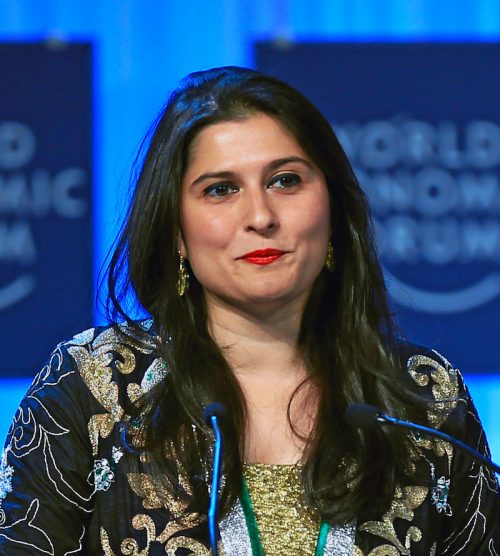All hell broke loose online in Pakistan this winter after their first Oscar winner, Sharmeen Obaid, tweeted a complaint against a doctor who sent an unsolicited friendship request on Facebook to her sister following an E.R. visit. Sharmeen’s tweet provoked a firestorm of debate amongst Pakistani social media users, who shared a picture of Sharmeen posing with American film producer Harvey Weinstein “as proof” of Sharmeen’s double standards on sexual harassment.

Sharmeen is not the first Pakistani to incite calls to violence by going public about abuse. Member of Parliament Ayesha Gulalai received severe and terrifying censure from social media trolls for her public accusations of sexual harassment against former-cricketer-turned-politician Imran Khan. Similar critiques have also been used against Malala Yusufzai, Pakistan’s only woman Nobel laureate, when social media users suggested that photographs of her at Oxford University wearing a bomber jacket and jeans, under a modest headscarf, looked just like porn actress Mia Khalifa.
These issues are not limited to Pakistan alone, of course. Digital harassment has been a prominent issue in the United States as well, and the tactics trolls use to challenge women who speak out about harassment are strikingly similar in both countries. Trolls in both contexts deploy words like “feminazi,” or “man-hater,” accusing women of “exaggerating,” “attention-seeking,” or of “trivializing” “real” cases of abuse to further their own taste for drama. They create fake Facebook or Twitter accounts in the name of a woman (or other abused person) going public, using these accounts to post humiliating status updates or embarrassing personal details about the survivor. Women in both cases are quickly accused of being traitors, airing their dirty laundry on a global stage with implications for the reputation of their social groups or organizations.
Comparing American and Pakistani harassment cases highlights how geographically distant and culturally different locations draw on similar vocabularies of silencing, giving rise to global patterns of sex-based subjection. They also show how assumptions about gender and power work to screen men perpetrating abuse against women and others.

In the Pakistani setting, social media backlash against women who speak out about abuse taps into longer-running anxieties around women, publicity and the West. Seeing women who go public about abuse as excessively westernized, these anxieties suggest such women are exaggerating local problems before foreign audiences in order to win accolades from an unspecified “west” willing to pay “traitorous” women in visas, prizes, and scholarships for help in defaming Pakistan and Islam. While a cultural logic of purdah, (literally “screen,” a logic of gendered segregation) technically separates men who abuse women; these same logics don’t protect women against men’s invasion of their privacy once women have entered public domains. Wearing jeans, studying at Oxford, going to a hospital, or having a Facebook account or a cell phone all become avenues for men to take non-intimate, public interactions into the private zone, seeking an unsolicited and unwelcome intimacy, or hiding behind the cloak of online anonymity to create humiliating memes about these women.
While gender arrangements in the US don’t operate according to purdah norms, the Harvey Weinstein case, including the doubt and shaming of women who participated in the #metoo campaign afterwards, highlights the repertoires men can use to screen their abuse of vulnerable colleagues. Bullying, browbeating, pay offs, and threats of job loss or legal action act as a kind of purdah to silence women. Similarly, American women complain about receiving unsolicited “dick pics” over various digital formats from men they barely know. Indeed, the prevalence of digital forms of harassment across both geographical settings renders online anger against people who come out about abuse inexplicable.
If there is any virtue at all to the recent firestorm, it is that Pakistanis and Americans have begun to ask: what constitutes abuse? How should people respond? Are micro-harassments, such as pictures and friendship requests still inconsequential if they are widespread and relentless? These cases invite us to dwell more deeply on connections between geographically distant cases of sex-based oppression. Mobile feminists, moving back and forth between different contexts, can reflect more deeply on the ways that various binaries, West/Islam, Public/Private, and offline/online complicate discussions about sexual identity, abuse and power in both locations. Highlighting how different geographic locations and cultural contexts share these problems in common can developing a common vocabulary for talking about sex-based subjection.
Fauzia Husain is an AAUW International Doctoral Fellow and a PhD candidate at the University of Virginia, Department of Sociology. Her current research examines how Pakistani women security workers experience their work, contend with the stigma of breaching purdah (gender segregation), and enact agency at the interstices of state, gender, work and globalization.

Comments 2
Sexual Politics in November 2017 - Sexuality Policy Watch — November 14, 2023
[…] Silencing sexual harassment complaints in Pakistan and the US – The Society Pages […]
Book Publishing Services in USA — January 11, 2024
Are you searching for Book Publishing near me? Look no further! Book Publishing HQ transcends geographical boundaries, offering our services to aspiring authors worldwide. Our online platform ensures that distance is never a barrier to turning your literary dreams into published works.